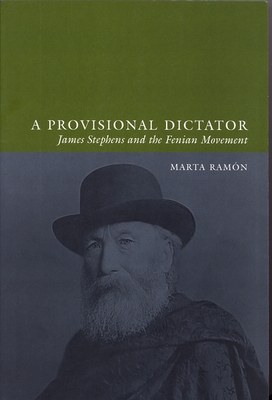A Provisional Dictator: James Stevens
Michael O'Sullivan reviews A Provisional Dictator: James Stephens and the Fenian movement by Marta Ramon, UCD Press, ISBN 978-1-904558-64-4, £18.95/€28 pbk

FOUNDER AND chief organiser of the Fenians, and their foremost political thinker, James Stephens is still something of a neglected, figure, at least among biographers.
Only two full-length studies of him have been published, Desmond Ryan's meticulously researched portrait in 1967 The Fenian Chief and RV Comerford's competent but unsympathetic 'revisionist' analysis The Fenians in Context in 1985.
Neither work qualifies as biography, or life study, in the generally accepted sense. Both concentrate on the significant events and political issues that made up the revolutionary social environment that Stephens and his comrades moved in. Seldom do they probe beyond the politics and the conspiracies to discover what went to fashion Stephens the man.
Consequently, Ryan and Comerford between them seem to have established something of a pattern in Stephens studies which later researchers have chosen to follow.
Marta Ramon describes her new work on Stephens as "a study of his life and work" and though she does on occasion introduce interesting snippets of information on his family background and upbringing the book is really another political portrait in the now well-established vein.
It is though a comprehensive assessment of Stephens' influence on the politics of his time and his pivotal role in establishing the Fenian organisation and maintaining its revolutionary impetus.
Ramon's account of his part in Smith O'Brien's Young Ireland rising of 1848, which Stevens followed with years of intrigue in Paris, greatly enhances our knowledge of this important but previously somewhat obscure apprenticeship stage of Stephens' career.
Adept at political infighting and always the manipulative arch-conspirator, Stephens not only headed the Irish branch of the movement but also manoeuvred to seize power over the parallel organisation in the United States, founding along the way his own successful propagandist organ The Irish People.
He continued supreme until his promised rising of 1866 failed to materialise and he was eclipsed by more personable figures like O'Leary and Kickham. The damp squib of the rising aside, however, Ramon correctly holds that without Stephens' talent for organisation and propaganda the IRB could not have flourished as it did and provide in time the springboard for the triumph of 1916.
Marta Ramon's work is a revealing portrait of Stephens the consummate revolutionary, an international socialist ahead of his time, with not a little of the anarchist in him. Not the much needed full biography, though an important addition to our understanding of this intriguing personality.
Connolly Association, c/o RMT, Unity House, 39 Chalton Street, London, NW1 1JD
Copyright © 2007 MIchael O'Sullivan

